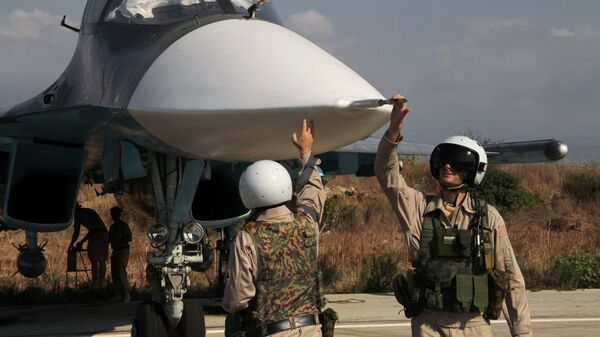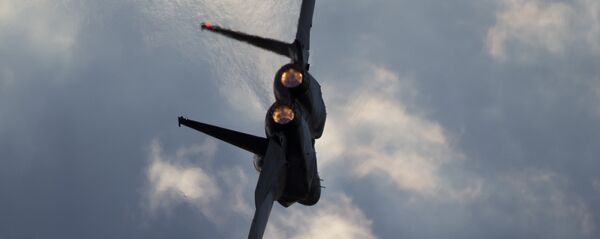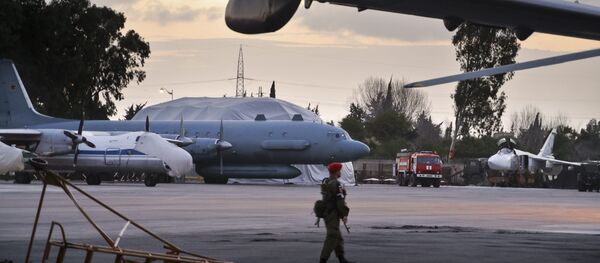Sputnik discussed the downing of the Russian military airplane with Dr. Lorenzo Trombetta, a Beirut-based scholar and journalist specializing in Syria.
Sputnik: The spokesman for the Russian Defense Ministry accused the Israeli pilots of using the Russian plane as a cover, putting it in the line of fire coming from Syrian air defense systems; meanwhile, Israel has blamed Damascus, Iran and Hezbollah for the tragedy. What's your assessment of this incident?
Dr. Lorenzo Trombetta: Russian President Vladimir Putin said that it was tragic circumstances that led to this accident. As you know, in the Eastern Mediterranean, many players are involved in the Syrian conflict.
We have a rift between Iran and Israel and that was the trigger of the incident, that Israel was supposedly going to strike alleged Iranian targets in north-western Syria, mainly in Latakia, but on the other side we also have a sort of military coordination between Israel and Russia, on the other side we have very strong tactical and military coordination between Iran and Russia and Russia and the Syrian government, so Russia is at the center of the network of alliances and rivalry at the local regional level, where Russia is still playing the role of a super international power and it's also paying the price.
Hmeimim Base, the main Russian airbase in the Mediterranean and the Middle East, is very close to the Latakia airstrikes from Israel, so I do think that Russia and Israel will continue to coordinate themselves, they will find better ways to coordinate, trying to soften the damages of this, but the ongoing war between Israel and Iran will continue.
READ MORE: Most Recent Cases of Plane and Helicopter Losses in Syria
Dr. Lorenzo Trombetta: Clearly Israel doesn't have an interest in warning Russia too early, as I was saying before, Russia has a hotline coordinated with both Iran and the Syrian government, so Israel is aiming to do as much damage as much as possible to alleged Iranian targets in Syria and, perhaps, the Syrian government military and civil institutions, so they're not interested in giving too much information prior to attacks.
I think they only respect the formal agreement to alert Russia in advance, but that was too late from the Russian perspective.
I confirm from an outsider's point of view because I'm not part of the inner military circles in Israel and Russia, I would think that the mutual accusations between Moscow and Israel will lead to better coordination; both need to save their strategic alliances, so the only thing that could happen after this accident would be to improve and try to stop the damages.
Sputnik: Now how likely is that this tragedy involving Russia's IL-20 plane will somehow change the ongoing peaceful settlement in Syria, what are your thoughts?
Both found common ground, finding a mid-term, not a long-term, solution to deal with. From the Russian point of view, the terrorist hotbed Idlib and from the Turkish point of view trying to expand their influence in north-western Syria.
So this incident only highlights the fact that there are many other countries, many other relationships to take into account when dealing with the Syrian conflict, not only the struggle between Turkey and Iran or Turkey and Russia, but also, as I said before, Israel and Iran playing on the Syrian playground.
Sputnik: What's your forecast concerning the future of Russia-Israeli corporation in Syria now, moving forward?
Dr. Lorenzo Trombetta: I think both countries, beyond actual passive coordination can, in two or three years, develop at least 2 or 3 years of different mutual messages on how to respect the red lines.
Russia, undoubtedly, is trying to expand its influence into the Eastern Mediterranean, where Israel has been for the last decades one of the biggest players. So for sure, these two countries will have some friction and the accident that happened is one of the tragic moments of the relationship. That would continue to follow the course of an alliance, the convergence of interest between these two major players in the area.
The views expressed in this article are those of the speaker, and do not necessarily reflect those of Sputnik.




